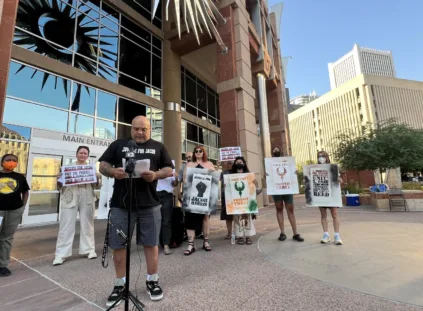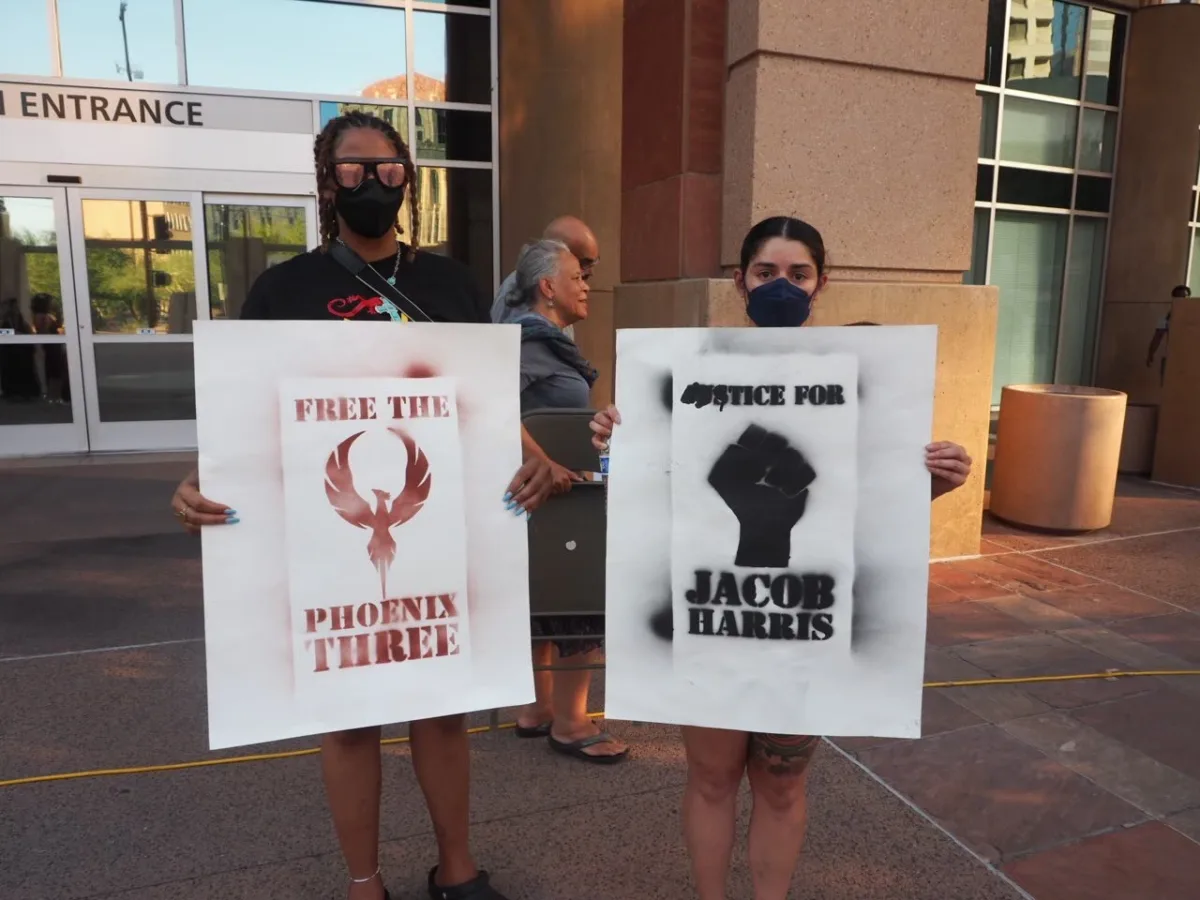DOJ Demands Phoenix Police Change. Victims Say More Is Needed.
In June, the DOJ said the Phoenix Police Department routinely commits egregious civil rights violations. Community members are demanding change—and the release of three Phoenix youths imprisoned for a murder committed by a police officer.

On a sweltering July 10 afternoon, members of the Justice for Jacob Harris, Free the Phoenix Three coalition gathered outside Phoenix City Hall in the wake of a damning Department of Justice report into the city’s police department. The groups had gathered to demand the freedom of Johnny Reed, Sariah Busani, and Jeremiah Triplett—three young people currently incarcerated for the police killing of 19-year-old Jacob Harris in 2019. The Maricopa County Attorney’s Office charged the trio with Harris’s murder—despite the fact that a police officer killed Harris.
“We demand the freedom of Jacob Harris’s wrongfully incarcerated friends’ Triplett, Busani, and Reed,” said Armond Malear from the Phoenix Metro Participatory Defense Hub, an organization that helps families challenge wrongful convictions and unfair sentencing. “They are all serving time for the murder of Jacob Harris due to the unjust and unconstitutional felony murder law.”
Last month, the DOJ released the findings of a three-year investigation into civil rights violations by the Phoenix Police Department. The DOJ found that Phoenix officers regularly use excessive force, discriminate against people of color, unlawfully detain unhoused people, and violate the rights of protesters.
In addition to demanding Reed, Busani, and Triplett’s freedom, community members are calling on the city to make changes to address the systemic injustices outlined in the DOJ report. Federal officials are likely to ask Phoenix to sign a legal settlement known as a consent decree, which requires agencies to submit to independent federal monitoring to ensure that reforms are implemented. So far, city officials have balked at the idea of federal oversight.
“There must be accountability,” Jessica Walburn, an outreach coordinator with Arizona Asian American Native Hawaiian and Pacific Islander for Equity, said in an interview with The Appeal. “There needs to be prosecution. If the police were just a regular person on the street, if I was accused of any of the things they outlined in that report, I would be arrested. And I would go to jail.”
The Justice for Jacob Harris, Free the Phoenix Three community coalition includes the families of Harris, Reed, and Triplett, as well as grassroots organizations like Black Lives Matter Phoenix Metro, Decarcerate Arizona, and the Anti Police-Terror Project. In a press release, the coalition highlighted several other policy changes city and state officials could make to address the injustices highlighted in the DOJ report, including:
- Ending youth enhancements and trying young people as adults
- Ending the felony murder law
- Repealing the law allowing officers to murder “unarmed fleeing felons” (ARS-13410)
- Termination and license revocation for officers who shoot suspected individuals in the back
- Setting timely expectations for medical aid
- Ending qualified immunity
- Ensuring officer reprimands remain in their files permanently
“We know the Phoenix PD killed Jacob, shooting him in the back, and his three friends should not be held liable for his death,” said Whitney Meilan from the Free Billie Allen Campaign. “The DOJ has a responsibility to not just investigate and report the brutality of the PPD, but to actually enforce change.”

Among the many shocking findings detailed in the report, DOJ officials found that the Phoenix Police Department teaches officers that “escalation is de-escalation,” meaning officers can escalate a situation with deadly force in order to defuse it, and has a ‘use it or lose it’ policy with projectile weapons— meaning the department takes weapons away from officers who “did not fire them enough.”
In 2021 and 2022, officers pointed a gun at someone at least 6,013 times—roughly 8 times per day. The Phoenix police department determined that every single one of those incidents was within policy.
During a June press conference announcing the DOJ’s findings, Kristen Clarke, the assistant attorney general for civil rights, referenced the police killing of Jacob Harris, who was shot in the back multiple times as he ran away from police.
“Phoenix officers shot a man and after he fell, fired multiple projectiles at him then sent a police canine to drag him back to them,” Clarke said. “The pain they inflicted was extraordinary, but, for nine minutes, officers failed to provide medical aid. Tragically, that man died.”
As Clarke described, after shooting Harris through several of his vital organs, Phoenix police officers stood around and allowed Harris to bleed out on the ground. Instead of helping him, police shot him in the face and rear with beanbag rounds, then made a police dog bite the teenager and use its teeth to pull Harris along the pavement.
“The DOJ said what happened to Jacob was violation of his civil rights,” Roland Harris, Jacob’s father, told The Appeal. “Yet Bertz [the person who killed Jacob] is still an officer. The officer who shot Jacob with a beanbag while he was on the ground is still an officer.”
“None of these officers have been reprimanded—not even for deleting their WhatsApp communications,” Roland said, referring to the fact that officers admitted in court that they were using WhatsApp to communicate on the night of Jacob’s death, but deleted the messages. “How come every officer who deleted those communications that night hasn’t been criminally charged with hindering the homicide investigation into Jacob’s death?”
The Maricopa County Attorney’s Office was able to charge Reed, Busani, and Triplett with Harris’s murder because of Arizona’s felony murder law, which allows people to be charged with murder if someone dies during the commission of a felony. State Senator Anna Hernandez introduced a bill to repeal the law this year, but the bill did not get a hearing.
Prosecutors initially sought to sentence Reed, Busani, and Triplett to death, said Roland Harris. Ultimately, a judge sentenced the trio to 15, 10, and 30 years respectively. They remain incarcerated to this day.
Rachel Mitchell, the head of the Maricopa County Attorney’s Office, defended the prosecution of Jacob’s friends in a statement shared with The Appeal.
“The Maricopa County Attorney’s Office is confident in the sentencing imposed two years ago. In each of their cases, there was overwhelming evidence of guilt under the law. These individuals pled guilty to the crimes committed and their sentence was just based on their level of involvement, their age, and their criminal history.”
Reed, who was 14 at the time police killed Harris, was sentenced to more years in prison than he had been alive. His family previously told The Appeal that they took a plea deal because they were afraid their child would spend the rest of his life in prison if they did not plead guilty. Mitchell is running for reelection this year.
“You guys are taking my 14-year-old baby and signing his whole life off,” Reed’s aunt, Shawanna Chambers, said in an interview with The Appeal last year. “They were never going to hold the police accountable for Jacob’s murder. It was going to be us.”
